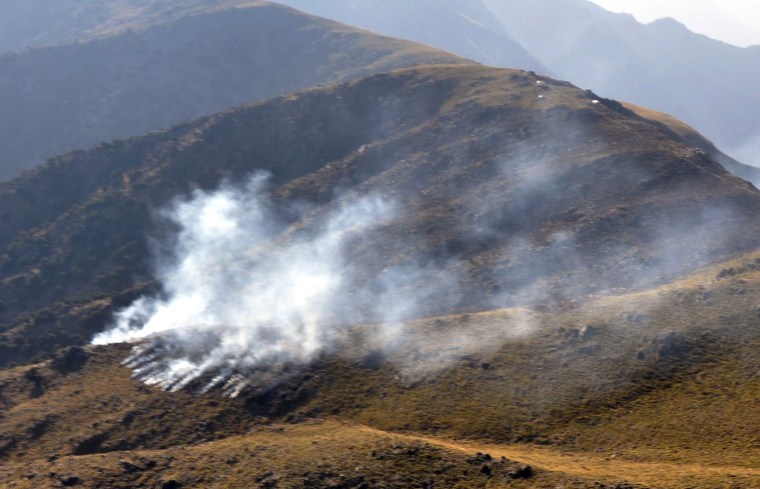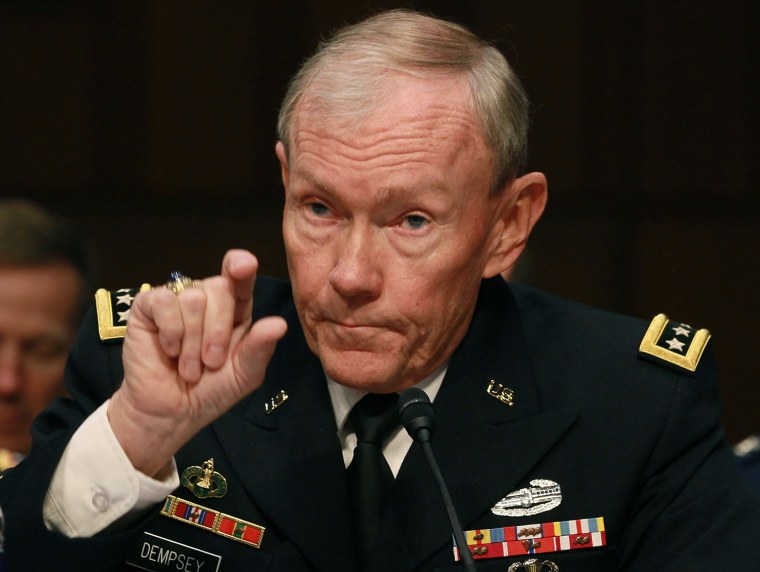The top U.S. military officer on Wednesday strongly rejected accusations from Pakistan that NATO deliberately killed 24 Pakistani soldiers last weekend.
Gen. Martin Dempsey, chairman of the U.S. military's Joint Chiefs of Staff, told Reuters that he was trying to discuss the incident with Pakistan behind closed doors.
"Candidly we don't want to try to resolve this issue through the media. No offense," he said in a wide-ranging interview, which also touched on Iran and Israel, as he flew back to Washington after a trip to London.
"The one thing I will say publicly and categorically is that this was not a deliberate attack."
In comments widely published in Pakistani media on Wednesday, Pakistan's director general of military operations, Major General Ishfaq Nadeem, described the NATO cross-border attack as a deliberate, blatant act of aggression.
Nadeem said NATO forces were alerted they were attacking Pakistani posts but helicopters kept firing.
"It was impossible that they did not know these to be our posts," The News quoted Nadeem as saying at an editors' briefing held at army headquarters on Tuesday.
Dempsey declined to discuss details of the U.S. military's review into the incident, but questioned Nadeem's logic.
"What in the world would we gain by attacking a Pakistan border post?" Dempsey asked.

Nadeem said the NATO helicopters appeared near the post around 15 to 20 minutes past midnight, opened fire, then left about 45 minutes later. They reappeared at 0115 local time and attacked again for another hour.
Dempsey said the military was poring over its own data from the incident.
"We're in the process of reviewing radio traffic, gun tapes, all of the things that an investigation has to consider before I can really make any statement about the duration," Dempsey said.
"But I can say, categorically, it was not a deliberate attack."
Ties strained
The incident has plunged U.S.-Pakistan ties into crisis and threatens to set back peace efforts in neighboring Afghanistan, where the United States is gradually withdrawing troops after a decade of war.
Pakistan has pulled out of an international conference in Germany next week on Afghanistan's future. It has also blocked ground supply routes through Pakistan to U.S. forces in Afghanistan and ordered the United States to vacate a remote air base in Pakistan used for drone flights.
Without acknowledging the use of drones at the Shamsi Air Base, Dempsey confirmed a report by Reuters on Tuesday that preparations were already underway to leave the facility.
"We've been told to leave so we have to prepare to leave. And you know, we're doing the calculations on what the airlift (will need to be) to take the equipment out of there," he said.
Dempsey played down the operational impact of the moves during his trip to London this week, saying the U.S. military had tactical alternatives.
"What I'm really concerned about is the deterioration of the relationship with Pakistan long-term, not its immediate effect on any tactical actions," Dempsey said.
Perspectives differ on Iran
Demspey, addressing Iran's nuclear program, said he did not know whether Israel would alert the United States ahead of time if it decided to take military action against Iran.
He also acknowledged differences in perspective between the United States and Israel over the best way to handle Iran and its nuclear program.
He said the United States was convinced that sanctions and diplomatic pressure was the right path to take on Iran, along with "the stated intent not to take any options off the table" - language that leaves open the possibility of future military action.
"I'm not sure the Israelis share our assessment of that. And because they don't and because to them this is an existential threat, I think probably that it's fair to say that our expectations are different right now," Dempsey said in an interview as he flew to Washington from London.
Asked whether he was talking about the differences between Israeli and U.S. expectations over sanctions, or differences in perspective about the future course of events, Dempsey said: "All of the above." He did not elaborate.
He also did not disclose whether he believed Israel was prepared to strike Iran.
Iran is facing new sanctions after the International Atomic Energy Agency (IAEA) reported earlier in November that Tehran appeared to have worked on designing a bomb and may still be conducting secret research to that end.
Iran says its nuclear program is peaceful.
